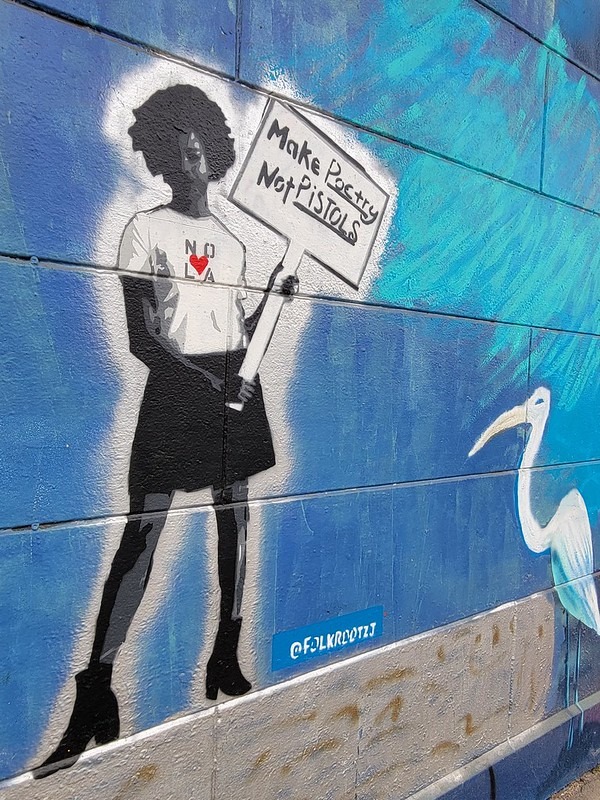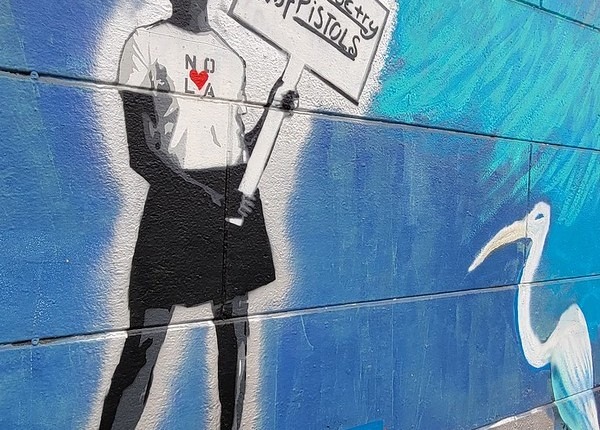. . .
Across cultures and time, poetry has been intertwined with protest. The elements of protest – using the voice towards progressive change – often align with the purpose and structure of poetry.
Speaking up for oneself while drawing upon the imaginative empathy that enables one to voice narratives and perspectives beyond oneself makes poetry an ideal artistic platform to say what needs to be said to incite societal change.
I was able to explore this phenomenon through teaching a series of classes on Protest Poetry recently through Kitchen Table Literary Arts, a local nonprofit that provides programming and resources for BIPOC women and femme-identifying writers.
This opportunity enabled me to examine the relationships between protest and poetry in a deeper way, uncovering how the intersection of the two have manifested not only within the world but also within my own life.
Recognizing that protest poetry doesn’t always have to be loud and public, that it can also be subtle and intimate, was a crucial realization about how it operates.
While some people may assert that art doesn’t always need to be political, that beauty should be the primary criterion for its existence, we could find truth in words spoken by Iranian-American poet Solmaz Sharif: “Every poem is an action. Every action is political. Every poem is political.”
In this way, even a poem that is concerned primarily with recognizing and spreading beauty is in a sense behaving as a form of protest, especially when the world the poem operates in is filled with ugliness such as hatred, greed and violence.
The intimacy of experience that can also be considered protest poetry requires us to connect to our own bodies, our human form that holds these experiences. Especially for women and BIPOC people, this connection and effort to uncover the injustices and oppressions that have been cast upon our bodies is an important act.
When I was preparing materials for the Protest Poetry classes, I became increasingly aware of how decolonization is a vital process of healing which requires a close examination of what has been forced upon us and then casting that off. Colonization often begins with language and ideas, so it makes sense that it is through language that we can also begin to decolonize the aspects of ourselves that we decide are necessary to transform.
It begins with our own tongue, which ironically, is both bound and empowered by the colonizing language that we speak and even that I’m typing as I write this piece. Clearly, it is a complex process consisting of many layers and at times, more questions than answers.
Asking questions and allowing space for those questions to remain in the air, while turning them like handling a Rubik’s Cube, is another way poetry operates as an ideal forum for protest. And like our goal when handling a Rubik’s Cube, in poetry we aim to draw connections, attempting to align the colored squares of our existence through a series of twists until it makes sense – until we are closer to forming unity between what is supposed to come together.
Protest, from this angle, is not a divisive act, but an attempt to right a wrong in order for all of us to live in a cohesive manner.
Many poets have explored the intricacies of social change, both on a personal and public level. Whether speaking of the body and its wonders like Lucille Clifton or taking on political issues in a direct and expansive style as encompassed in June Jordan’s work, BIPOC women poets have consistently voiced protest within their writings.
Today young poets such as Edythe Rodriguez challenge the imposition of assigned, European-based poetic forms while also learning and understanding how they work.
This awareness expressed within the genre itself and the need to self-evaluate how even poetic expression can become a tool of oppression is at the heart of protest. It is the need to turn into oneself to see the ways in which we can carry out change, starting with changing ourselves.

Locally, I will be featured in “A Voice, A Light: Protest Poetry Virtual Showcase” on October 4 at 6:30 pm. This virtual public reading is being held by Kitchen Table Literary Arts in partnership with the Poetry Foundation. You can find the Zoom signup for this free reading here.
Many talented poets will be featured, all of whom were students in my Protest Poetry class. I will be sharing some of my own poems, all of which, I’ve come to realize, are an act of revolution.



